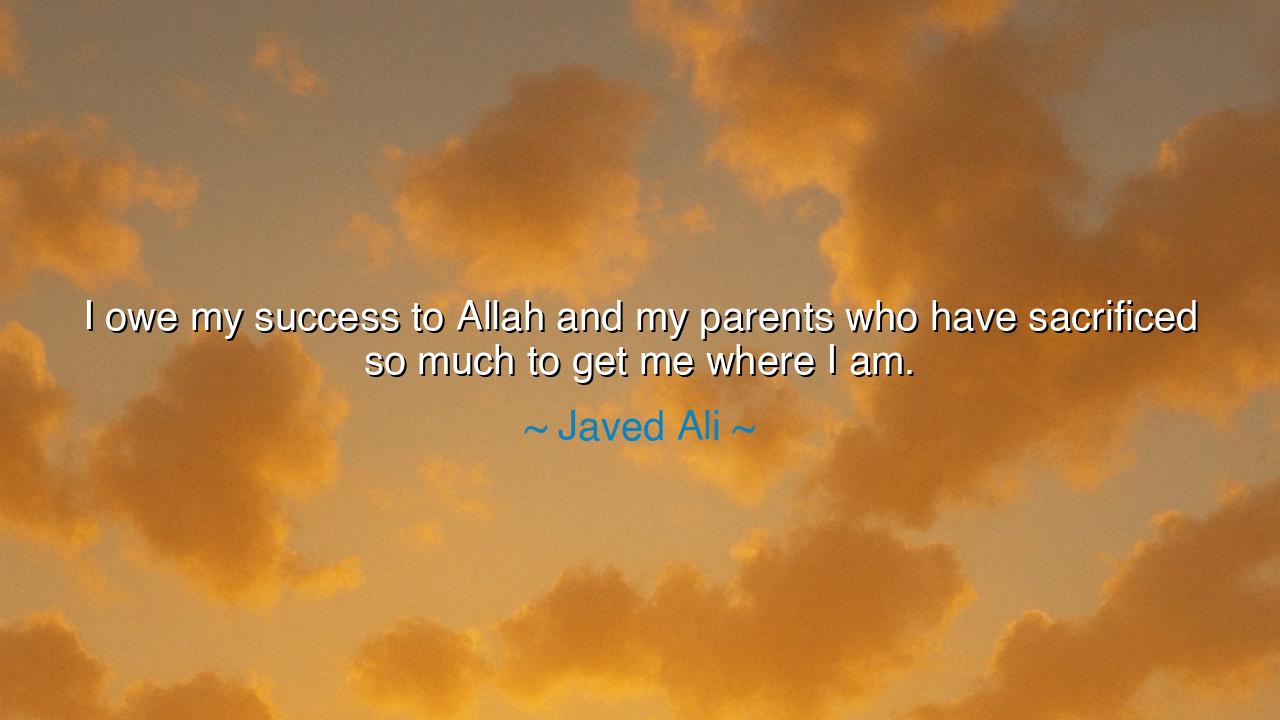
I owe my success to Allah and my parents who have sacrificed so
I owe my success to Allah and my parents who have sacrificed so much to get me where I am.






Hear the humble and radiant words of Javed Ali, who declared with reverence: “I owe my success to Allah and my parents who have sacrificed so much to get me where I am.” In this saying we hear the voice of gratitude, a virtue older than empires and nobler than crowns. For no man or woman rises by their strength alone; every success is woven from threads of divine blessing and the tireless sacrifices of those who loved us before we even knew how to love ourselves.
To give the first honor to Allah is to acknowledge that success is not the product of human will alone, but the gift of divine mercy. The ancients understood this well: Pharaohs built monuments, emperors raised armies, philosophers wrote wisdom, but all confessed that fate—the hand of the heavens—still ruled over man. Without the breath of life, without the unseen guidance of Providence, no victory endures. Gratitude to God is the recognition that we are vessels filled by a power greater than ourselves, and that our strength is but a spark of His light.
Yet Javed Ali does not stop at heaven; he bows also to the earth, to his parents. For it is often through the silent sacrifices of mothers and fathers that the soil of success is made fertile. How many nights of sleepless toil, how many days of hunger and hardship, how many dreams deferred so that their children’s dreams might flourish? Parents are the unsung builders of greatness, their names hidden behind the glory of their offspring. To acknowledge them is to honor the roots that nourished the tree.
History gives us examples of such sacrifice. Consider Thomas Edison, whose mother removed him from a school that dismissed him as “unfit to learn,” and took it upon herself to nurture his education. Without her faith and labor, the genius of Edison may never have been awakened. Or recall the life of Abraham Lincoln, who often spoke of the influence of his mother, saying that all he was or ever hoped to be he owed to her prayers. These stories mirror Ali’s words: behind every shining figure, there are shadows of love and sacrifice unseen by the crowd.
The meaning of this quote, then, is not only about Ali’s personal journey but about the universal law of gratitude. Those who forget their benefactors—who attribute their success only to themselves—walk a dangerous path of pride and isolation. But those who honor God and their parents walk in humility, and humility is the crown that endures. To be grateful is to stay rooted, to remember that greatness is not seized alone but carried upward by many hands.
Therefore, beloved seeker, take this wisdom into your own heart: if you have tasted even a drop of success, look upward and give thanks, and look backward to honor those who carried you when you could not walk. Do not be blind to the sacrifices of others, nor deaf to the prayers whispered on your behalf. Success without gratitude is an empty vessel; but success filled with thankfulness becomes a fountain that blesses others.
Practical action lies before you: begin each day with a word of thanks—to God, to your parents, to those who shaped your path. If your parents yet live, honor them not only with words but with deeds, with kindness and care. If they are gone, carry forward their legacy by living with the values they instilled. And above all, share your success generously, for the best way to honor those who gave to you is to give to others in turn.
And so, remember Javed Ali’s words: true success is not yours alone—it belongs also to God, and to those who sacrificed for you. Live in gratitude, and your achievements will not only shine for yourself but will illuminate the path for generations to come. For gratitude transforms success from a personal triumph into a timeless legacy.






AAdministratorAdministrator
Welcome, honored guests. Please leave a comment, we will respond soon